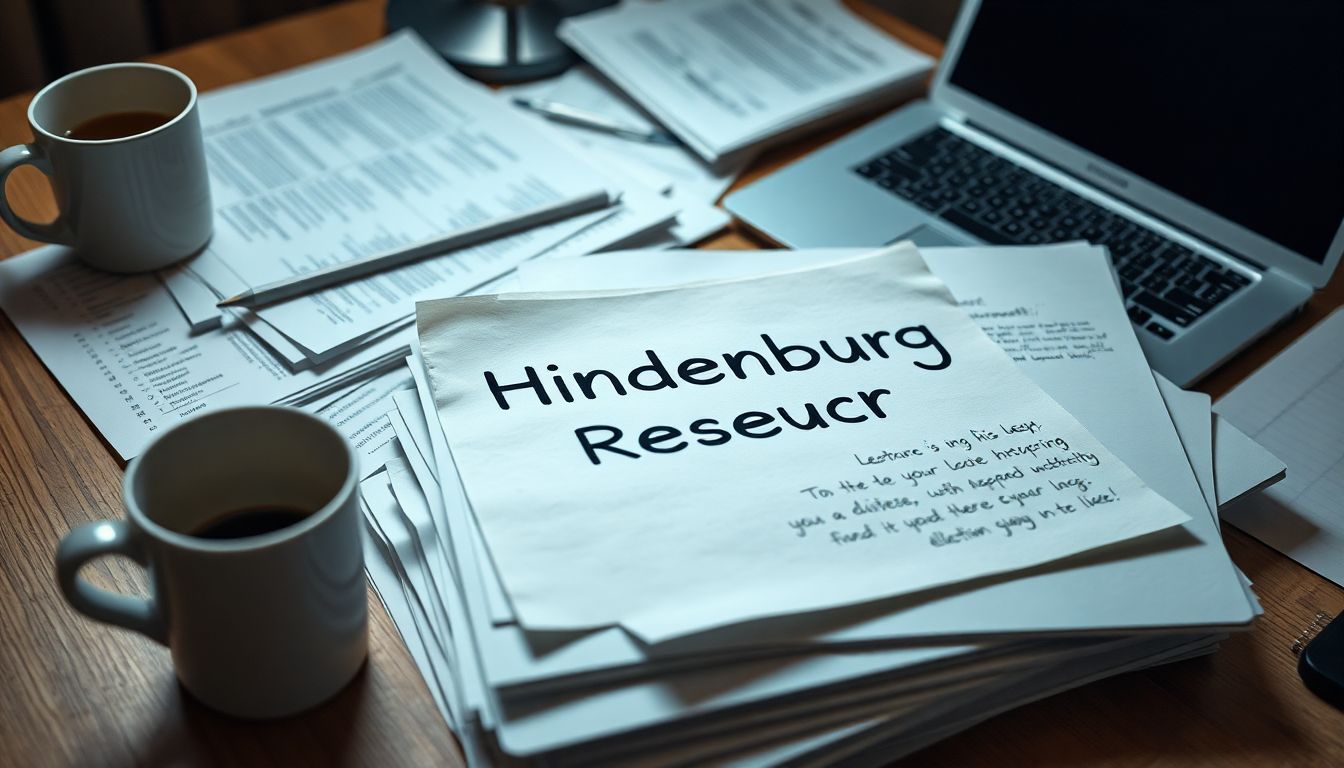
Hindenburg Research’s Demise: Why the Adani Accusers Are Shutting Down
The recent announcement that Hindenburg Research is disbanding has sent shockwaves through the financial world. This firm, known for its bold claims against companies like the Adani Group, has now decided to close its doors. What does this mean for the future of investigative research into corporate wrongdoing?
The Sudden Disbanding: A Seismic Event in the Financial World
Hindenburg Research’s shutdown comes as a surprise. The firm gained notoriety for its aggressive short-selling tactics and high-profile reports. Now, as they exit the stage, many wonder about the implications of this decision.
Initial Reactions and Market Impact: A Rollercoaster Ride
The news sparked mixed reactions. Investors reacted swiftly, causing stocks to fluctuate. Some viewed this as a chance to speculate, while others considered the potential loss of accountability in corporate practices.
Setting the Stage: A Recap of the Adani Group Allegations
To grasp the full impact of Hindenburg’s closure, it’s vital to recall their allegations against the Adani Group. The firm published a report claiming the conglomerate engaged in stock manipulation and accounting fraud. This explosive revelation rocked the market and laid bare serious questions about corporate governance.
Hindenburg Research’s Modus Operandi: Unveiling Their Investigative Tactics
Understanding how Hindenburg operated sheds light on their effectiveness. They specialized in short-selling, which involves betting that a company’s stock will decline. This strategy often breeds skepticism toward businesses, driving their share prices down.
Deep Dive into Short-Selling Strategies: Profiting from Market Volatility
Short-selling can be risky but lucrative. Firms like Hindenburg Research capitalize on market volatility, seeking profits when stock prices fall. This method puts pressure on companies to maintain ethical standards.
Methodology: Data Analysis, Interviews, and Whistleblower Information
Hindenburg employed a mix of data analysis and direct interviews to build their cases. Whistleblower insights played a vital role, providing internal viewpoints that traditional reports often lack. This approach made their accusations more compelling.
Past Successes and High-Profile Targets: Examining Hindenburg’s Track Record
Hindenburg made headlines previously with allegations against various companies, such as Nikola Corporation. Their aggressive stances often led to significant financial consequences for their targets. This established them as a major player in financial journalism, but it also came with risks.
The Adani Report and its Fallout: A Catalyst for Change?
The Adani report was more than just another financial analysis; it ignited discussions about corporate accountability.
Key Allegations and Evidence Presented in the Report
The Hindenburg report highlighted questionable financial practices, including allegations of inflated share prices and irregularities with offshore companies. This prompted intense scrutiny from investors and regulators.
Adani Group’s Response and the Ensuing Legal Battles
Immediately after the allegations surfaced, the Adani Group denied all claims and initiated legal action against Hindenburg. This confrontation escalated tensions and renewed debates about truthfulness in the corporate world.
Impact on Investor Confidence and Market Capitalization: Statistical Analysis Needed
Despite denials, investor confidence took a hit. The Adani Group witnessed a substantial dip in market capitalization, reflecting the immediate effects of the allegations. Such market dynamics show the direct link between corporate conduct and investor trust.
Financial and Legal Ramifications for Hindenburg Research
Closing shop isn’t merely a business decision; it comes with considerable ramifications, financially and legally.
Potential Lawsuits and Regulatory Scrutiny: Navigating Legal Challenges
With legal threats lingering from the Adani fallout, Hindenburg faced potential lawsuits. The risks associated with their operations accumulated over time, pushing the firm towards dissolution.
Resource Allocation and Operational Costs: Factors Contributing to Closure
Maintaining a hedge fund requires extensive resources. Operational costs likely mounted, making sustainability a challenge as their investigations spiraled into costly legal battles.
Impact on Future Short-Selling Activities: Implications for the Industry
The closure could cast a shadow on future short-selling activities. With a significant player gone, other firms may think twice before launching their own investigations, fearing backlash or similar fates.
The Broader Implications for Corporate Governance and Transparency
The events surrounding Hindenburg’s disbanding may be a precursor to increased scrutiny in corporate practices.
Increased Scrutiny on Corporate Practices: A New Era of Accountability
Investors and regulators may now demand greater transparency. The Adani case raised questions about how corporations operate and the need for clear accountability.
The Role of Short-Sellers in Corporate Governance: A Necessary Evil?
The role of short-sellers is often debated. While they expose wrongdoing, critics argue they can destabilize markets. However, this delicate balance is essential for effective corporate governance.
Strengthening Regulatory Frameworks: Learning from the Adani Case
The Adani case highlights a pressing need for tougher regulations. Policymakers may need to consider new frameworks to ensure that companies adhere to ethical standards.
What the Future Holds for Corporate Investigations and Whistleblower Protection
As Hindenburg fades into history, questions about the future of corporate investigations loom large.
The Need for Enhanced Transparency and Accountability Measures
Corporations must prioritize transparency to regain trust. With the closure of a bold firm like Hindenburg, lapses may surface unless companies take proactive steps.
Protecting Whistleblowers: Safeguarding those Who Expose Corporate Wrongdoing
Institutional support for whistleblowers is crucial. Protecting individuals who risk everything to expose fraud can help shape a more ethical corporate culture.
The Evolution of Investigative Journalism and its Role in Corporate Governance
Investigative journalism must adapt. As scrutiny tightens, the need for rigorous fact-checking and ethical reporting becomes paramount in holding corporations accountable.
Conclusion: Lessons Learned and the Path Forward
The disbanding of Hindenburg Research serves as a reminder of the delicate balance between investigation and accountability in financial markets.
Key Takeaways: A Summary of Findings and Future Predictions
- Hindenburg’s closure signals challenges for short-sellers.
- The Adani case may lead to stronger corporate regulations.
- Whistleblower protection becomes vital for future accountability.
Call to Action: Demanding Greater Corporate Transparency
Investors and citizens alike should advocate for transparency in corporate practices. Holding companies accountable ensures a healthier economic landscape.
Final Thoughts: The End of an Era and the Beginning of a New One
As Hindenburg Research exits, the conversation about corporate ethics must continue. The landscape may shift, but the strive for accountability remains essential.
Saif Ali Khan Attacked: Police Release Suspect Visuals, Full Incident Details












Can you be more specific about the content of your article? After reading it, I still have some doubts. Hope you can help me.
Thanks for sharing. I read many of your blog posts, cool, your blog is very good.
Sir i can not approve my adsense please help me
Thanks for sharing. I read many of your blog posts, cool, your blog is very good.
Your article helped me a lot, is there any more related content? Thanks!
I don’t think the title of your article matches the content lol. Just kidding, mainly because I had some doubts after reading the article.
Your point of view caught my eye and was very interesting. Thanks. I have a question for you.